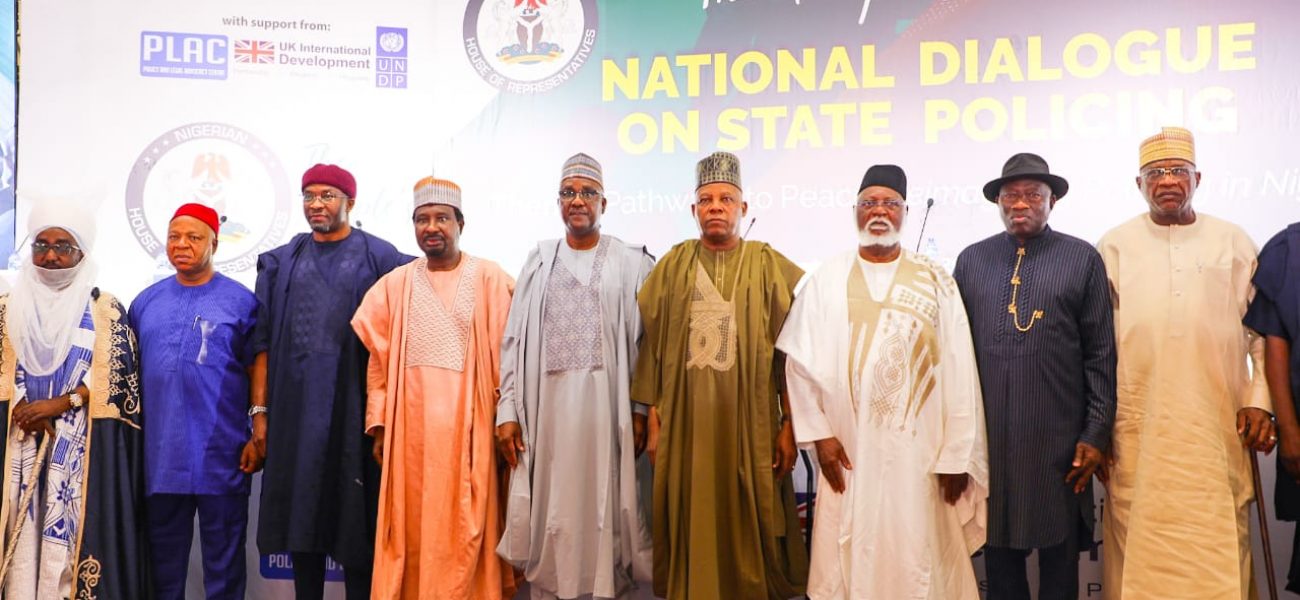The House of Representatives convened a National Dialogue on State Policing with the theme, ‘Pathways to Peace: Reimagining Policing in Nigeria’ on Monday, April 22, 2024 in Abuja. Policy and Legal Advocacy Centre (PLAC), with support from the United Kingdom Foreign, Commonwealth and Development Office (FCDO) joined the House of Representatives to organise the event.
The event which was a platform to stir conversations on the best policing model for Nigeria with focus on State Police, had several stakeholders drawn from the government, security agencies, traditional rulers, civil society organisations, the media and the international community in attendance.
The welcome remark was delivered by the Deputy Chairman of the House of Representatives, Rt. Hon. Benjamin Kalu. He stated that Nigeria was under-policed with the figure for police personnel placed at 370,000 and not meeting up to the ratio of 1 police personnel per 450 citizens as recommended by the United Nations. He called for cross-fertlisiation of ideas on State policing and expressed the commitment of the House of Representatives to provide the right framework and oversight for effective State policing if it is decided as the way to go.
The Constitution Alteration bill on State Police is sponsored by the Deputy Speaker and 14 other Members of the House of Representatives.
In his goodwill message, the Executive Director of PLAC, Clement Nwankwo noted the need to tackle insecurity in Nigeria though effective policing. He stated that there are concerns about State Police, including the possibility of abuse by Governors.
The Minister of Police Affairs, Ibrahim Geidam posited that State Police will enhance responsiveness to local crises and community policing but also pointed out the possibility of political interference in the absence of checks and balances.
AIG Ben Okolo who represented the Inspector General of Police, stated that there was a need to address the challenges that make policing ineffective in Nigeria today. He explained that instead of State Police, the leadership of the Nigeria Police recommends that the Nigeria Security and Civil Defence Corps and the Federal Road Safety Corps (FRSC) be made departments of the Police. Other recommendations include increased funding for the Police, to enable procurement of adequate ammunition and equipment, facilitate adequate trainings, as well as standard housing and office structures for the Police.
The representative of the British High Commissioner in his goodwill message, noted that the decision for a policing model for Nigeria is a sovereign decision. However, he added that good modern policing must have features such as operational independence, robust accountability measures and respect for human rights and the rule of law.
Other goodwill messages were delivered by the Secretary to the Government of the Federation, the representative of the Chief of Defence Staff and development partners such as the German Ambassador to Nigeria, Annette Gunter and a representative of the UNDP.
The President of the Senate represented by the Deputy President of the Senate, Senator Jibrin Barau, noted the importance of finding a common ground to enhance the security architecture of Nigeria and make it accountable and free from the shackles of extremism, politics and tribalism.
In his keynote address, the Speaker of the House of Representatives, Rt. Hon. Tajudeen Abbas stated that the vision of the House is to support police reform and curb insecurity in Nigeria. He added that whatever system of policing Nigeria adopts must support the efficiency of the Police Force.
Former Head of State, General Abdulsalami Abubakar and former Nigerian President, Goodluck Jonathan were at the event and lent their vices to the conversation. President Bola Tinubu was represented by the Vice President, Senator Kashim Shettima.
There were plenary discussions which provided a platform for interaction among the guests and participants at the event. Some of the issues that were discussed include national security challenges, the benefits and challenges of State Police, the global perspectives and models of State policing, as well as the institutional and legal frameworks for state policing options in Nigeria.
Conversations around State Police have been on-going for some time, as an alternative to the federal Police system Nigeria currently operates. The House of Representatives has expressed intention to take forward the perspectives shared at this event, as well as input from the generality of Nigerians on the issue of State police, as the Constitution Alteration exercise of the 10th National Assembly progresses.

